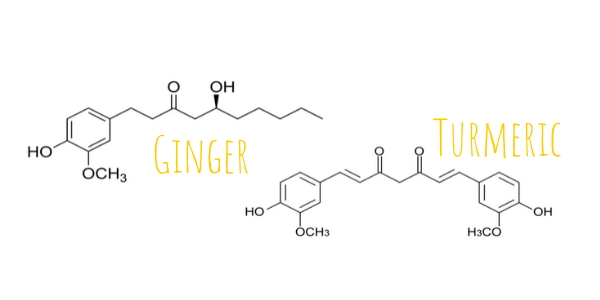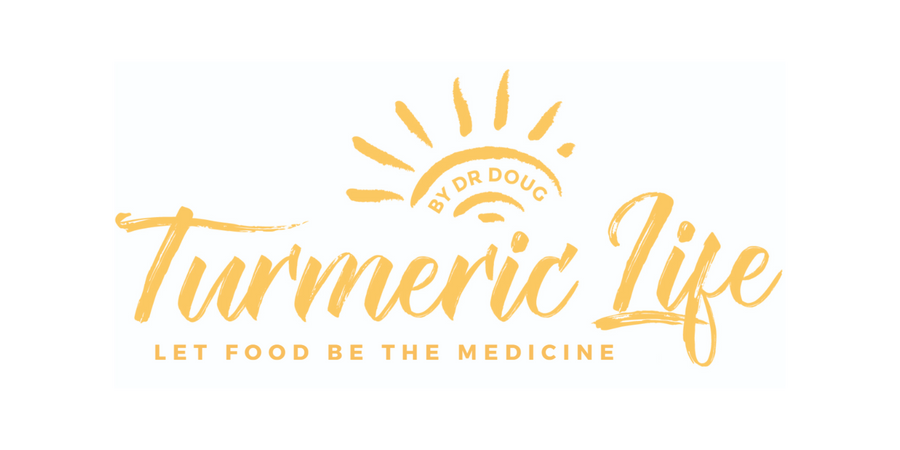
The Synergy Between Ginger and Turmeric
The Synergy Between Ginger and Turmeric
The research on the potential health effects of both ginger and turmeric is plentiful, and we are receiving testimonials daily from customers using the GingiBams power bars for their health & pain management. So, let's investigate why Turmeric and Ginger work so well together.
Ginger is in the family Zingiberaceae, same as turmeric (Curcuma longa), cardamom (Elettariacardamomum), and galangal and has long been used to manage the symptoms of gastric upset including nausea, pain, and inappetence. It combines well with and has many synergies with turmeric.

Let’s get a little bit technical for a second….
Ginger contains several active components/oils including:
- Sesquiterpines: zingiberene, ar-curcumene, beta-sesquiphellandrene, beta-bisabolene.
- Pungent phenolic compounds: gingerols, shogaols, zingerone, paradol. Zingerone and shogaols in larger amounts in dried rhizome and extracts.
- Other like diarylheptanoids, which are same family as curcumin.
What does that mean for my health?
1. Gastrointestinal Tract -
Ginger stimulates saliva, bile flow and gastric secretions, improving appetite and intestinal motility, carminative, anti-spasmodic, improves colic, diarrhea, and bloating. It reduces the effect of gluten intolerance and positively modifies the bacterial colonisation of intestinal epithelial cells.
2. Antioxidant -
It is a highly significant eliminator of free radicals produced by normal living stress, exercise, radiation (like turmeric, it protects against sunburn and other electromagnetic radiation[DE1] such as X-rays), and toxins.
3. Anti-inflammatory -
Ginger adds to the potent turmeric effect and operates on similar pathways in the reduction of inflammatory prostaglandins. It has no irritant effect on gastric mucosa and selectively reduces inflammatory cytokines with no interference with essential immunity. It modulates pathways activated in chronic inflammation in arthritis and demonstrated significant reduction in inflammatory cytokines superior to indomethacin.
Whole ginger reduces joint inflammation and cellular destruction in rheumatoid arthritis.
4. Anti-emetic -
There are several mechanisms and components. Ginger is known to reduce cancer radiation GIT distress due to the antioxidant properties, scavenging free radicals, and inhibits lipid peroxidation. It also stops serotonin-induced diarrhea. It is also great in pregnancy reducing morning sickness.
5. Anti-ulcer -
There is a significant demonstrated inhibition of gastric lesions and protects against the effects of indomethacin.
6. Immunomodulation -
Ginger shows some degree of immunomodulation with reduced delayed-type hypersensitivity which assists reduction of severity of auto-immune disorders like Crohns [DE2], psoriasis.
7. Glycaemic response -
With an increased insulin sensitivity and levelling serum glucose level, ginger inhibits key enzymes controlling carbohydrate metabolism and is insulinotropic rather than hypoglycemia. This means that ginger enhances glucose uptake in skeletal muscle and other tissue, thus improving insulin resistance.
8. Liver Protective -
For alcohol-induced liver damage, there are proven significant hepato-protective effects resulting in increased glutathione, superoxide dismutase, and protein levels and marked reduction of liver fibrosis. Much like turmeric, ginger is also a significant treatment to support a damaged liver; the two compounds should be used concurrently.
9. Kidney Protective -
Ginger exhibited a significant dose-dependent nephroprotective role in experimentally-induced acute renal damage when given as standalone treatment – 250mg/kg or 17.5g powder for a 70kg person.
10. Antimicrobial -
It enhances aminoglycoside antibiotics by increasing bacterial cell membrane permeability to them in enterococcae. It also enhances intestinal absorption of azithromycin, erythromycin, and cephalexins. Anti-Schistosome, anti-nematode, antifungal and antiviral in vitro. Topical application of essential oils of ginger has activity.
11. Chemoprotective -
Inhibitory effects demonstrated against breast, ovarian, gastric, pancreatic, colonic, prostate, liver cancers and leukemia. Induces apoptosis of cancer cells.
There are several key components for this in whole ginger or whole ginger powder.
- Antihistamine
- Anti-anxiety - similar effect to Valium.
- Positive Inotrope - is an agent that alters the force or energy of muscular contractions including heart.
- Hypotensive – lowers blood pressure similar to calcium channel blockers like veramil.
Clinical Uses of Ginger:
- Ease nausea and vomiting in pregnancy, car sickness, post-operative, and post-chemotherapy settings
- Rheumatoid Arthritis
- Post-exercise muscle pain (delayed onset muscle soreness (DOMS)) – 2g powder
- Dysmenorrhoea 250-500mg powder 4 times daily during menstruation proved equal to 250mg mefenamic acid or 400 mg ibuprofen
- Digestive aid: appetite stimulant, increases saliva flow, increases gastric secretions
- Flatulence
- Colic
- Intestinal spasms
- Migraines
- Lowering lipids and cholesterol
- Pain
- Cognition
- Diabetes – improved fasting blood sugar and insulin sensitivity.
- Weight loss – increases fat utilisation and may slow fat absorption.
- Asthma
- Ulcerative colitis and IBD – found to equal sulfasalazine
Adverse Effects:
Reported intestinal irritation in some. Some people also report heartburn, bloating, and contact dermatitis.
Interactions
- Warfarin – there is a theoretical risk of increased bleeding at a high ginger dose but not evident clinically and no evidence at usual intakes.
- Antiplatelet drugs – caution.
- Is fine with pregnancy
The research on the potential health effects of both ginger and turmeric is plentiful, and we are receiving testimonials daily and weekly from customers using the ginger power bars for their health & pain management.
Have you had your Turmeric and Ginger today?
Dr. Doug English
